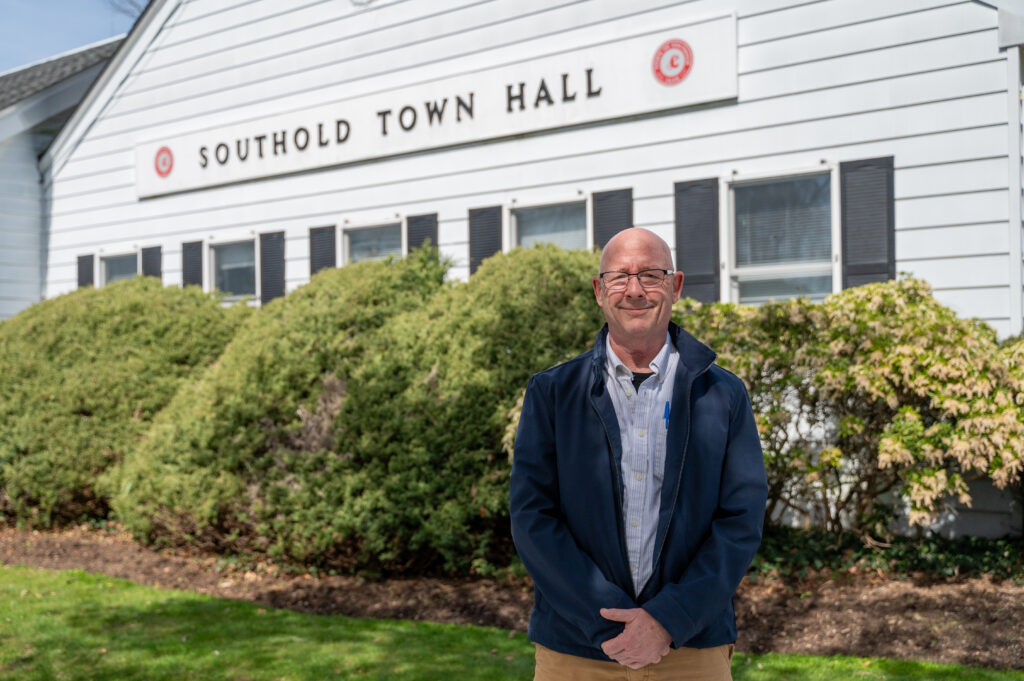Current Southold Town water use not sustainable, study shows

With summer in full swing, water usage is peaking — and threatening the supply from the aquifer. As a result, Southold Town is looking to “lead by example” when it comes to water conservation efforts.
During a Town Board work session Tuesday morning, members of the water conservation committee presented a study revealing one harrowing reality: Current water use in Southold Town is not sustainable.
“It kind of shocked me,” said committee member Glynis Berry, who is also executive director of the Riverhead organization Peconic Green Growth, which is focused on improving the region’s environmental health. Ms. Berry noted that the town’s water supply is “exacerbated” by both coastline development and uneven pumping patterns created by seasonal demand and irrigation.
Demand is highest in summer months, when rainfall is lowest. According to data from the Suffolk County Water Authority, nearly five times more water is used in July than in February. Nearly 40 percent of Long Island’s summer water use is for irrigation — usually lawns, said committee member Robin Simmen. “That’s really where our precious potable drinking water is going — and it’s a limited resource,” she said.
Referencing a 2010 map of the aquifer, Ms. Berry noted that it has already shrunk as water is pulled away from peninsulas like Nassau Point. “When we pump too much, it can’t always recover,” she said. “We’ve got a real problem because it’s so sensitive.”
In its report, the group estimates that at the current rate, the aquifer could be 40 feet shallower by 2030, with additional negative wetland impacts such as loss of vegetation and wildlife habitats.
The committee has set several goals for its conservation efforts that align with the state Department of Environmental Conservation’s 2017 recommendation that the Suffolk County Water Authority reduce peak demand by 15 percent across Long Island. Ms. Berry, highlighting the discrepancy between water usage in households, cited tiered pricing based on consumption as one possible action, as well as working with the DEC to meter large wells throughout the town.
The committee agreed that educating the public and demonstrating best practices could serve as a launchpad for more involved conservation efforts. Ms. Berry suggested metering all town wells, planting rain gardens and using sensors for irrigation as possible solutions.
Replacing your golf-course-green lawn with native plants?
“Lawns are a fashion,” Ms. Simmen said, noting that lawns became a “fad” in the ’50s and ’60s.
Councilman Robert Ghosio, who serves as liaison to the water conservation committee, said, “I’ve always loved my lawn, but as I’ve learned more and more, I’ve tried to make changes myself.” Those changes include recharging roof runoff and letting native clover grow rather than strive for perfection, which in turn has reduced his water consumption. “My lawn is still fairly green and my plants are growing,” Mr. Ghosio said.
An example of a thriving rain garden can be found at the Red House at Inlet Pond County Park in Greenport. Last year, Ms. Simmen worked with Cornell Cooperative Extension and a group of volunteers to plant 30 species of 160 plants native to Long Island in front of the house. By channeling rainwater from the roof with piping, the garden is now lush and green, all without irrigation.
Supervisor Scott Russell asked if any grant opportunities were available that could help the town be more water-wise. According to Ms. Berry, there’s an August deadline for a $20,000 Long Island Community Foundation grant.
“They’re not huge grants, but it might help us get to the next step,” she said, asking if the town would also be willing to match the grant.
Mr. Russell said it would be easier to identify the projects and actual cost before committing any town funds. “It’s better to make an application around a specific project,” he said, asking that the committee present those plans at a future board meeting.
Conserving water
Tips from the Suffolk County Water Authority:
• Check for leaky faucets and toilets
• Turn off the tap while brushing teeth, shaving and soaping up your hands.
• Always wash full loads when running the clothes washer or dishwasher.
• Irrigate wisely: set timers properly and install rain shut-off devices and moisture sensors, if one isn’t built-in, to reduce excess watering.
• Use native plants that require little water in place of lawn areas.
• Mulch gardens and flower beds to prevent water loss through evaporation and keep soil moist.
Curious about your own usage? Check your water footprint at watercalculator.org.
Correction: A quote attributed to Ms. Berry should have said exacerbated, not exasperated. We regret the error.









